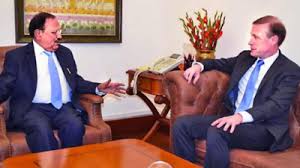WASHINGTON: US National Security Advisor Jake Sullivan on Monday met with his Indian counterpart, Ajit Doval, with discussions focused on fostering joint production and development of strategic technologies to deliver “secure, reliable, and cost-competitive” technology solutions for global challenges.
Highlighting the progress achieved in sectors like space, semiconductors, biotechnology, clean energy, and cybersecurity, the meeting also reaffirmed a shared commitment to addressing national security concerns and enhancing collaboration in multilateral forums.
The White House in a factsheet titled ‘The United States and India Committed to Strengthening Strategic Technology Partnership,’ said, “Today, US National Security Advisor (APNSA) Jake Sullivan met with Indian National Security Advisor (NSA) Ajit Doval, Indian External Affairs Minister S Jaishankar, and Prime Minister Modi in New Delhi as the United States and India continue to forge a strategic technology partnership that benefits both of our countries and our partners around the world. Sullivan and Doval launched the US-India initiative on Critical and Emerging Technology (iCET) in 2022 at the direction of President Biden and Prime Minister Modi. In the intervening years, our two nations have taken significant steps forward together to integrate our technology and defense supply chains in recognition that, now more than ever, we need to work with our partners to build a trusted and resilient innovation base.”
“During their capstone meeting, Sullivan and Doval underscored the vital importance of the efforts to jointly produce and develop strategic technologies that will allow both the nations to deliver secure, reliable, and cost-competitive technology solutions for the world,” the factsheet added.
Sullivan and Doval also reaffirmed shared resolve to adapt and strengthen technology protection toolkits and discussed efforts to address national security concerns associated with overcapacity in key technology sectors. They also commended the progress made to address long-standing barriers to bilateral strategic trade, technology, and industrial cooperation.
The White House further said that both the nations are deepening their collaboration across critical sectors, including space, semiconductors, biotechnology, cybersecurity, advanced telecommunications, and clean energy.
“As the United States and India deepen collaboration across key sectors – from space to semiconductors, biotechnology, cybersecurity, advanced telecommunications, and clean energy – we have seen the promise of our partnership deliver results. Our partnership has also anchored multilateral work with like-minded nations from across the Indo-Pacific and Europe, including the Bio-5 Biopharmaceutical Supply Chain Consortium, the US-India-ROK Technology Trilateral, and ongoing cooperation with Australia and Japan through the Quad,” the White House added.
Sullivan during his meeting with Doval also spoke about US’ efforts to finalise the necessary steps to delist Indian nuclear entities, which will promote civil nuclear cooperation.
US NSA Sullivan briefed the Indian side on the updates brought out by the Biden administration to US missile export control policies under the Missile Technology Control Regime (MTCR) that will boost US commercial space cooperation with India, according to the Ministry of External Affairs (MEA) press release.
In a press release, MEA said, “Reflecting the progress the United States and India have made–and will continue to make–as strategic partners and countries with a shared commitment to peaceful nuclear cooperation, NSA Sullivan announced US efforts to finalize necessary steps to delist Indian nuclear entities, which will promote civil nuclear cooperation and resilient clean energy supply chains.”
For the meeting, NSA Sullivan was accompanied by a delegation of senior US government officials. Doval and Sullivan have engaged regularly in a high-level dialogue through extensive discussions on a broad bilateral, regional and global agenda.
After the launch of the India-US Initiative on Critical and Emerging Technologies (iCET) by Prime Minister Modi and US President Joe Biden on the sidelines of the Quad Summit in Tokyo on 24 May 2022, NSA Doval and NSA Sullivan have driven concrete initiatives between the two countries in various sectors, including Artificial Intelligence, Quantum Computing, Semiconductors, Telecommunications, Defence and Space.
“The current visit gave them the opportunity to review ongoing progress in their high-level dialogue, including in diverse fields such as Defence, Cyber and Maritime Security,” MEA said in a press release.
On Monday, Sullivan also visited IIT Delhi and noted Ajit Doval’s efforts to propel US-India partnerships on various projects.
In his address at IIT Delhi on Monday, Sullivan said, “I would like to recognise my counterpart, the National Indian National Security Advisor Ajit Doval, because it was in part his vision. That technology, and particularly advanced technologies of the future would be a propellant for the US-India relationship in a way that could take our two countries forward, advance our respective interests, protect our respective values, and build a better world for everybody.”
“And through this partnership, through this initiative, and through so many other things that Ajit and I have had to deal with over the course of the past 4 years, he and I have developed a deep personal relationship, a deep professional relationship, and it is that relationship in part I believe that has helped play such a critical role in ensuring that the US-India partnership has reached a new high level,” he added.


